
Vol. 1, No. 29 Published by India China Division, Air Transport Command August 2, 1945
To Face Enemy Atrocities 1347 BU, Shamshernagar, India - When little Mother Desales, of the Shillong Catholic mission, came to this base to meet the daily shuttle one day this week, GI's here got first-hand information on how the ill-disciplined Japanese hordes treat non-combatants. Back in 1942, when the Japs were flushed with early victories while rolling across Burma, one of the towns they captured was Sandoay, between Akyab and Rangoon. Sandoay was the home of Lasallet mission, where Catholic Sisters of Our Lady of the Mission refused to leave the natives to face the Jap advance alone and were unceremoniously thrown into confinement by the invaders. Held Incommunicado Captured in May of that year, they daily witnessed scenes of indescribable Jap cruelty and barbarism until their rescue short months ago. Mother Mary and Sister Amelia, who are ow on their way to the Shillong Mission, lived to talk about it. With three other nuns, they were held incommunicado by the Japs. Not even the captured Catholic priests were allowed to speak to the sisters at any time. Mother Mary, suspected of having a radio transmitter, had been thrown into jail on three different occasions. She was held in vile quarters for long periods. During one incarceration she was forced to remain in a filthy cowshed for ten days on starvation rations. When British forces began squeeze-playing the Japs southward in the recent Burma campaign, planes bombed out a huge Jap ammo dump at Henzada. Too close for comfort, the hard-pressed Japs retreated via lorries. Abandoned by Japs For ten days - hiding in jungle thicket by day, traveling cautiously by night - they fled the steadily-advancing Tommies. With Mother Mary believed to be at the point of death, the sisters alternately prayed and steeled her during the rough flight. After the nuns
The British took them to Rangoon, and there the ATC took over, flying them from Chittagong to Shamshernagar for return to the Civil hospital at Sylhet. Greeted by Mother Desales at Shamshernagar, where they were temporarily housed at Red Cross quarters, they are now on their way to the hospital to recuperate - after three years of Jap terrorism. Capt. Daniel McGuire, ATC chaplain here, who saw to the sister's comfort while they were at this base, received their heart-felt thanks and appreciation for the speed with which they were flown to safety and rest. |
By Sgt. Mark Schindler
1333 BU, Chabua, Assam - Jeeping along on the Assam Truck highway, S/Sgt. Harry Yotter, Allentown, Pa., perceived an object in the distant mountain which did not fit into the pattern of the surrounding landscape.
It might have been a lightning-struck tree stump or even a telephone pole, but Yotter and his group of Sunday explorers decided to investigate.
Making their way up the side of the mountain through jungle growth and mud, they came upon the hill from which they could look down at the nature-camouflaged locale - burial grounds of Assamese moguls who died hundreds, perhaps thousands of years ago.
Silence and Awe
The object which looked like a tree stump proved to be the protruding dome of one of the larger temples in the valley. It was approximately 300 feet high, made of compact bricks and rocks. There were 12 temples in all, each of different height and structure, erected within 100 yards of each other.
The outside walls were decorated with stone plaques of idols, fantastic images, primitive oxcarts and other figures depicting an ancient civilization. At the entrance to the largest temple was a huge plaque with the figure of a 12-handed goddess.
Without stopping to think whether or not it was sacrilegious to enter the final resting place of the tribal rulers, the group of explorers opened the huge gate which was held to the temple by stone hinges. They descended a stone stairway in silence and awe.
Heavy Plaques
Coming unprepared for this exploration, the group gazed at the interior with the aid of cigaret lighters and paper torches. The stairs led deeper underground. At the foot of the stairs was the room which they thought was the actual burial room. Through the dim light of flickering lighters they were able to glimpse the crypt which they supposed was the reason for the temple having been built.
An apparently bottomless pit of water stood between the edge of the stairs and the crypt, preventing further approach. Perhaps the pit was the builders' way of placing a "do not disturb" sign on the tomb of their leader. The magnified echo of the slightest sound made it an eerie place to be spending a Sunday afternoon, and the explorers soon left.
The next temple showed all signs of once having been looted. On the outside wall one of the stone plaques, estimated to weigh at least 300 pounds, had been removed from its groove, and moss had grown over in its place. Inside, a seven-foot-square groove faced the entrance, and particles of chipped rock on the floor indicated that the crypt had been removed not too long ago.
Untouched by Man
One of the explorers decided to photograph the series of temples. He climbed the slippery roof almost to the top of one of the larger temples and, from where he stood, learned one of the possible reasons why few had ventured here before. Surrounding the grounds was a large lagoon opposite which were tall jungle-covered mountains - a natural barrier against approach. In the lagoon, untouched by man for centuries, grew gigantic water lilies with buds the size of a full-grown watermelon.
After exploration of four temples, the tour had to be cut short, as darkness was falling. The group left with no souvenirs other than photographs - substantial proof of the valley explored. All resolved to return with a better supply of film, searchlights and some K-rations.
Sultan Says Nip Won't Be Beaten Quite So Easily
Denver (ANS) - Lt. Gen. Dan I. Sultan, new Inspector General of the Army, said that the Japs will not be conquered until their homeland proper and Manchuria are invaded.
He termed "most unfortunate" the feeling in the U.S. that the Japanese were ready to quit. The general admitted he was "a pessimist" but asserted that the war with Japan "would last at least another year, but I hope not two years."
He explained that after seeing the Japs in action he was convinced, "As a race they're not going to quit until they're thoroughly licked. The Jap is licked now but he's trying his best to struggle out of the southeast corner of Burma into Siam.
"One of the most surprising things of the war is the fact that each Jap who is captured believes he is the first to have been taken prisoner," Sultan said. "You have to show him some other Japs to convince him he's not alone as a war prisoner."
Thousands Crowd Hooghly To Watch Great Air Show
Calcutta - While thousands watched from the banks and jetties along the Hooghly River, planes of the AAF went through their paces Wednesday in a spectacular air show. It was the first observance of Army Air Force Day, on the 38th anniversary of the birth of that branch of the armed forces.
|
Speeding through the skies in formation, the P-38s, C-46s, C-47s, B-25s, L-5s, PBY-5s, P-51s and B-24s created a scene of suspense and thrill for the earth-bound people who watched from below.
Because of safety restrictions, the planes maintained a minimum altitude of 1,000 feet over the river and surrounding countryside. But because of fast, expertly-executed maneuvers and precision formation, many "oohed" and "ahed" as the planes zoomed, stunted and passed in review,
This Calcutta show was one of the many which were viewed by military and civilian personnel throughout the theater. Air shows were out on at various bases to give people an opportunity to see the air arm in action.
Most amusing part of the program here was formation flying by two L-5s and a P-38. By lowering wheels and flaps flying at greatly reduced speed and maneuvering with the small liaison plane, the Lightning pursuit-interceptor managed to keep a fairly tight formation.
US-China Mail Time Is Cut to Ten Days By PO Augmentation
Kunming, China - Expansion of the Army postal system in China with the opening of four new APOs and nine mailing addresses has reduced the average delivery time from New York to Kunming from 15 to ten days, it was announced by Maj. Charles A. Perkin, theater postal officer.
"As soon as we can obtain more personnel, we can speed up our sorting, delivering and re-directing even more," Maj. Perkin said. The Kunming post office with only two officers and 28 enlisted men, now is handling 600,000 pounds of incoming mail and 150,000 pounds of outgoing mail each month.
"We intend to follow the troops into the field with small branch post offices, so we can serve the men better. Many men worry about their mail and packages being lost over the Hump," the major remarked, "but I can say that very little goes down."
|
|
THROUGH THE STATIC . . .
"Roger queen tower, niner-niner-niner." Through the static and crackle of the stormy night a call broke into the still of the radio room. "Tower, niner-niner-niner. Request landing instructions. Over."
Several men sat there, paid no particular attention to the disturbance. They continued their checker game, their letter writing, or made entries in the daily log. The weather was bad, ceiling about 300 feet, and the field was closed. One youngster looked up and listened.
"Tower, niner-niner-niner. Com in please. Tower, tower . . ." The pleading of the call faded into the background of electrical interference. The kid looked around, rushed to the mike and started working the ship. He was a new man. After two or three futile attempts to reach the plane an old tech sarge looked up and shook his head.
"It ain't no use, kid. You can't work that plane."
"Listen, Mac, I've contacted planes in weather worse than this."
"Yeah, but you ain't gonna work this one."
"Maybe not. But damn it. I'm goin' to try. How the hell can you guys sit there and let some poor pilot call in like that without trying to work him? He might be low on gas; he might be lost. What the hell's the matter with you guys?"
Mac put down his pencil and pondered over the kid.
"You're new here, ain't ya? Yeah, you've only been here about two weeks. This is your first storm, isn't it? Well, I'll yell ya something - 999 will never land. There's no use wasting your breath."
"How the hell do you know? I've seen ships make it in under worse stuff than this, and the let down here isn't too bad. If he wants to come in I'll bet he can make it."
"Maybe he don't want to land."
"What the hell do you mean?"
"Just what I said, maybe he don't want to land. Ya see, kid, that ship took off from the Valley for here two years ago and she ain't come in yet."
"But ..."
"Hand me that book there, kid. Yeah, that's it. The log on lost and unreported aircraft." Mac thumbed through the pages and pointed to an entry.
"C-87, 41-38999, missing in flight, home station PW. No report of crew. No wreckage sighted. Search abandoned. Crew listed as lost. Report Closed." He ran his finger down the page and read another entry made six months later: "Roger queen tower worked ship with call sign 999. Aircraft requested landing instructions. Did not reply to tower's call." And again he read another entry. This one was fairly recent - three months ago. "Tower worked aircraft 999, gave landing instructions despite fact field was closed. Tower operator reports sighting C-87 type plane flying past tower when lightning flashed. Aircraft did not land."
Mac looked up at the kid. Static crackled through the receivers, lightning flashed across the sky. He saw the kid jump and stare through the bubbled panes of glass. He was having his first glimpse of old niner-niner-niner.
"You see, kid, some ships never land. Some ships will fly forever. Pilots who love the air, and planes that were made to fly, just don't stop flying - it ain't their way of doing things. Old niner-niner-niner ain't gonna land there. Maybe they have a runway of their own somewhere in the sky; maybe we'll work the tower at that field someday - but not just yet.
It's this way, kid. Just like old soldiers never die, some ships will always fly."
"Tower, tower, niner-niner-niner, come in please." The static gargled, spat and then the room was quiet.
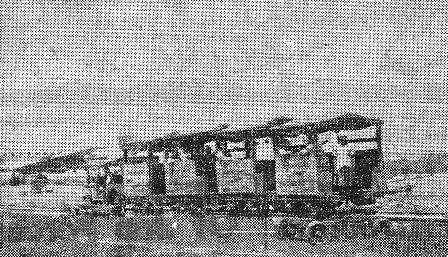 Myitkyina's Jeep Train hustles out to meet waiting Skymaster passengers. The train, consisting of four captured Jap cars, completes a circuit with
eight stops, including the passenger terminal and billeting area.
Myitkyina's Jeep Train hustles out to meet waiting Skymaster passengers. The train, consisting of four captured Jap cars, completes a circuit with
eight stops, including the passenger terminal and billeting area.
|
Jeep Railroad Constructed
From Abandoned Jap Cars
1348 BU, Myitkyina, Burma - Japs had used the cars to haul supplies in Burma.
After a thorough cleaning and some repairs these same cars are hauling airline passengers to and from parking ramps as planes stop here to refuel.
To obviate the necessity of walking in knee-deep mud, the Jeep railroad, sometimes dubbed the "Myitkyina & Saki Fe" line, was constructed. Powered by a jeep, the four captured Jap cars carry up to 30 passengers and their baggage.
Eight regular stops are scheduled on the circuit and include the passenger terminal, transient service, parking ramp and the post exchange.
Cars are painted a bright yellow and each is named for a person involved in the railroad's birth. The "West Virginian" is named for Maj. Richard N. Dunkle and Capt. Jack R. Jefferson who claim the idea came to them after a midnight snack of C rations. Why one car was dubbed the "Missourian" mystified GIs until it was disclosed that it was named for Maung Maung, the Burmese brakeman, whose life-long ambition has been to go to Kansas City for a steak.
Americans, Chinese Acknowledge Debt Owed Fighting Men
1360 BU, China - On the eighth anniversary of China's war with Japan, Americans from this base participated in ceremonies which paid tribute to the hard years of stubborn resistance put up by Chinese forces.
Color of the day was a parade by members of a Chinese youth movement, headed by its commanding general. A Chinese-Allied club, built by the Chinese for the American soldiers, was dedicated with speeches by the mayor of the town and Lt. Col. Joel Y. Ledbetter, CO of 1360.
A nip-and-tuck basketball game between men of 1360 and members of the youth movement unit concluded the day. Americans won the game 44 to 42.
Reverse Lend-Lease Nets 1311 Corporal Home State Product
1311 BU, Gaya, India - Batting the breeze with some English soldiers on TD who are quartered in his basha, Cpl. Donald E. Stuart, Bangor, Me., spoke of his state in reply to the question of where he lived in America.
"Oh, I say," said a chap from Warwickshire, "that's famous for sardines, isn't it?"
"In a way, yes," agreed Don, for indeed Maine once was full of thriving fishing villages. "Anyway, they certainly are tasty. Boy, I sure wish I had some of 'em now!"
"Do you?" queried the English lad. Reaching down into some of his belongings, the Britisher came up with two gleaming tins, pressing them upon the corporal. And the latter, over-joyed at the sudden prospect of a couple of sardine sandwiches, was completely flabbergasted to note that the covers on the tins stated: "Packed in Lubec, Maine."
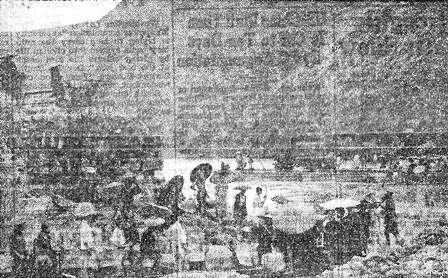 When monsoon floods washed out the bridge at an advanced supply base in China, a ferry was pressed into service to take supply trucks across the river.
According to Chinese, a 20-foot rise in the water level brought the river higher than it has been in 25 years. Chinese workmen and engineers already are
building a new bridge.
When monsoon floods washed out the bridge at an advanced supply base in China, a ferry was pressed into service to take supply trucks across the river.
According to Chinese, a 20-foot rise in the water level brought the river higher than it has been in 25 years. Chinese workmen and engineers already are
building a new bridge.
|
One-Man Campaign
To Stabilize Prices
Launched by Buyer
SOS Base, Chanyi, China - Pfc. Edward J. Sweeney, a food buyer on special duty with Chinese services of supply, has started a one-man campaign to save money for GIs.
In an effort to counteract local inflation and bring souvenir prices down to a reasonable level, Sweeney has proposed the publication of a Fair-Price list.
"Each zone or district should have a list," Sweeney explained, "which takes into consideration the value of raw materials from which each specific item is made, the overhead of the retailer, and a fair profit for all concerned."
Besides saving GIs money, Sweeney claims that his scheme would protect the Chinese consumer from further inflation and would establish a common ground of business ethics between the GI and the Chinese merchant.
From a Thoughtful Sis - One Bagful of Marbles
1333 BU, Chabua, Assam - Cpl. Albert O. Chenoweth, Decatur, Ill., received a package from his sister and now is wondering if she's just a practical joker or not acquainted with Army terminology.
Months ago his sister wrote wondering why his letters never contained gripes. In an attempt to satisfy, he proceeded to list his gripes and mentioned that if he were compelled to remain in Assam many more months, he was apt to "lose his marbles."
Thoughtful sis enclosed a package of vari-colored marbles in her last package and a note which stated: "In case you do lose your marbles, here's a few more to carry on with."
Cpl. Chenoweth now spends his free time shooting marbles with his tentmates.
Wardrobe Is Lifted From Show Troupe; Presentations Off
1340 BU, Kunming - An elaborate wardrobe used by the cast of "Room Service," and valued at $2,000, was stolen one night last week after a regular showing of the GI version of the Broadway hit.
The wardrobe consisted largely of U.S.-manufactured clothing and had been borrowed from the American, French and British consulates.
Future presentations of the show have had to be canceled pending recovery of the natty tweeds and dinner jackets.
Since clothing of the quality of those stolen is non-existent in China, officials believe they will have little difficulty in discovering the culprit and recovering the wardrobe.
|
B-32 Enters War, Totes Heavy Load New York (ANS) - The War Department has disclosed that the B-32, giant sister ship of the B-29, is now in action against the Jap homeland. Numbers of the immense and improved bombers regularly are rocking the enemy, along with fleets of the 20th Air Force's B-29s. Lofty Ceiling Army rules say no direct comparisons between the two planes may be made but it can be stated that the B-32, pride of Consolidated-Vultee, can carry a heavy bomb-load an "amazing" distance. "Its speed," said the Army, "is better than 300 mph." It has a lofty ceiling like that of the B-29 which can work from 32,000 feet. Its maneuverability is a joy, pilots report. Built for battle, the new plane easily can be transformed into a peacetime ship, engineers say. B-32s are being turned out in mass quantities at Fort Worth, Tex., and San Diego, Calif. Novel Catwalk It is materially lighter than the B-29 - about 20,000 pounds - which means bigger loads. The newest Jap-wrecker has a novel catwalk, through the bomb bay from the forward cabin to a rear cabin. Any of eight crew members easily can adjust matters if bombs get stuck. Reverse thrust propellers are another feature of the B-32. This is the first time this type propeller has been installed in large land planes. Reversible four-bladed propellers are invaluable in emergency landings on short runways where they constitute aerodynamic braking. 'The Tail' Flight testing of the new bomber began as far back as September, 1942, and tests continued until the plane was riding runways with a gross weight of more than 120,000 pounds, almost 20 percent more than asked for in the Army's original specifications. Men who fly the ship call it "The Tail" because of the huge empennage that makes it readily distinguishable. Crews are among the most thoroughly trained in history. A pilot gets 50 hours' training in the new plane before he flies it. He gets those 50 hours only after he has had 1,000 hours as a pilot of other four-engine aircraft. |
|
Sookerating recently opened its jungle indoctrination camp to nurses of an evacuation hospital at Chabua. Besides brushing up on their jungle technique the girls had a good time. 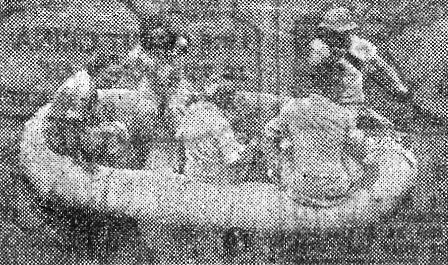 Taking a whirl in the Brahmaputra are Lts. Grace Hance, Mildred Herbstritt, Margaret O'Neil, L. H. Lundquist. F/O Harold E. Gray edged his
way in, too.
Taking a whirl in the Brahmaputra are Lts. Grace Hance, Mildred Herbstritt, Margaret O'Neil, L. H. Lundquist. F/O Harold E. Gray edged his
way in, too.
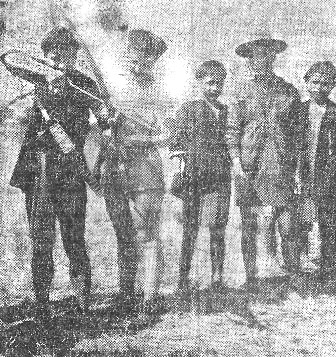 Lt. Mildred Miller getting pointers from a local archer.
Lt. Mildred Miller getting pointers from a local archer.
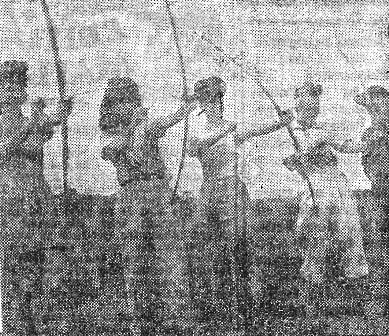 Archery again, with the ladies drawing the beads. Left to right: Capt. Edith Graham, Lts. Ruth Detweiler, Miller, Lillian Stegmier and instructor.
Archery again, with the ladies drawing the beads. Left to right: Capt. Edith Graham, Lts. Ruth Detweiler, Miller, Lillian Stegmier and instructor.
|
Is Full of
Old Wisdom
Scholars, Expounded
Early Sciences
By Prof. B. J. Vaswand
In a previous article I showed how ancient India discovered celestial music, and in endeavoring to bring it down into human life invented mundane music and systems which - through their migration from Persia and Arabia to Europe - have been the foundation of modern music in all countries.
Similarly, I showed how some of the greatest literature of Europe (e.g. ancient Greece) including its philosophy, has been deeply indebted to the literature and philosophy of India.
Cultural Colossus
The vast literature in poetry (dramatic, epic, lyrical), the vast literature in 60 different sciences (physical, mental and spiritual), numerous treatises in fine arts (music, dancing, sculpture, painting) - all written in Sanskrit, the ancient classical tongue of the Indo-Arayans - reveal clearly the nature of the Indian culture colossus.
It bestrode the world for centuries, stretching one hand of civilization, through Burma, Indo-China, Java, Sumatra, China and Japan right to the confines of the New World (which was known to India long before Columbus) and another hand across Afghanistan, Baluchistan, Persia and Arabia, right up to ancient Greece and Egypt.
Satisfactory evidence collected by Indian and European scholars is now available for all those who will look again into the fountain of wisdom, celestial and secular, which India can still give to the world.
Rig Veda, the oldest sacred book of the human race, shows from the descriptions of the movements of the heavenly bodies and categorical statements, that 4,500 years ago the ancient Hindus had already divided the universe into the regions: lithosphere (prithol), atmosphere or sky (antariksha), and heaven of stars, sun, etc. They already had discovered that the earth was a sphere "suspended freely in the air."
The sun was regarded as the cause of the seasons, and it was believed that it had seven rays (meaning the seven colors), that it caused the winds, that it seemingly rises and sets but in reality does no such thing, that it holds the earth and the heavenly bodies in their respective places by a mysterious power.
Five Planets Known
According to Ludwig, corroborated by other researchers, Rig Veda (nearly 2,500 B.C.) mentions inclination of the ecliptic with the equator and the axle of the earth, and the annual course of the sun was divided into two halves - uttaragana (north) and dakshinayana (south). Rig Veda says that the moon shines by the borrowed light of the sun. Phases of the moon and their relation to the sun were fully understood, and five planets were known.
The observations of the solar eclipse are mentioned, and an instrument called "turiga" by which they were able to calculate the occurrence, duration, beginning and end of an eclipse. The cause of solar eclipse was understood as the occulpation of the sun by the moon. These and many other advances in astronomy were made by the ancient Hindus thousands of years before Europe started the rudiments of that science.
The Hindus were led to these researches because offers to the gods were an integral part of their ancient religion, and these sacrificial offers were believed to be effective or ineffective according to the time (of day, season, year, cycle of years) in which they were held.
This was the original impulse for the cultivation of this science as well as the science of mathematics. But later all sciences started an independent existence, and further advances were registered throughout the succeeding centuries. That India is the mother of world civilization is no mere patriotic rhapsody or hyperbole.
No Steak Trouble Here; Deer Comes To Camp Mess Hall
1333 BU, Chabua - Men at the jungle indoctrination camp here learned that almost everything comes to him who waits - if he waits long enough.
Venison steaks had been scarce the past month and the weary hunters no longer were drawing guns from supply to go out on a hunt. It seems that prey, which once had been so plentiful, had left the vicinity of the camp. Visitors had to content themselves with C-rations and corned beef hash during their stay at Kemi-Nodi lodge.
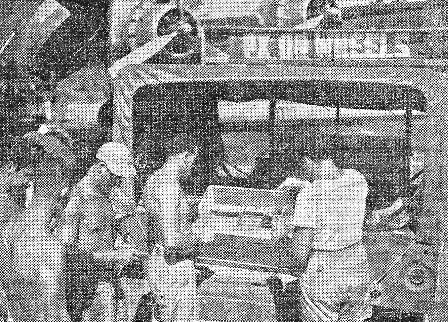 Tezgaon, India - The old-fashioned village peddler had nothing on Cpl. Harry Garson, New Haven, shown at right doling out post exchange supplies
to C-54 maintenance men on the flight line at 1346. The traveling PX, which saves GIs the mile trek to the base exchange is believed to be a big factor
in warding off "walker's cramp."
Tezgaon, India - The old-fashioned village peddler had nothing on Cpl. Harry Garson, New Haven, shown at right doling out post exchange supplies
to C-54 maintenance men on the flight line at 1346. The traveling PX, which saves GIs the mile trek to the base exchange is believed to be a big factor
in warding off "walker's cramp."
|
Then, one rainy morning, five of the men were sitting around playing with the camp mascot, monkey, Tojo, when a 600-pound buck Sambah deer marched nonchalantly through the gates. The men stared open-mouthed, then ran for the supply room and guns.
When they returned they found the deer about ready to enter the mess hall. A volley of fire let loose as everyone fired simultaneously.
Venison steak was plentiful for the next few days and hunting has resumed.
‘Brother Rat’ Hits Rice Paddy Circuit
"Brother Rat," an hilarious stage and screen comedy, has set forth on the banana and rice paddy circuit under the Entertainment Production Unit banner. The premiere was at the 1345 BU.
The first legitimate Broadway show to tour the IB Theater features a cast of 18 - three "beautiful" girls and 15 GIs. EPU supplies a lineup of Red Cross and GI talent headed by Jean DeBear, of Broadway and radio; Peggy Nevin, Glen Turnbull, James Crawley and Edward C. Perry.
"Brother Rat" will tour the entire theater, hitherto impractical for such a show because of bulky equipment. The new show has sets which collapse into small bundles, making it possible for the show to reach remote areas by 6x6.
Brother Squashes Medic's Proposal Via US Air Mail
1333 BU, Chabua, Assam - Many recall the tale of "Clive of India," whose life was portrayed on the screen years ago by Ronald Colman. While Clive sweated out his time in India, he came across the photograph of his friend's sister and proposed marriage without meeting her.
Love came to the chief clerk at the base sick bay in an identical manner. One look at the photograph of "Bubbles" Crookston, sister of Pfc. Anthony Crookston, made the medic a lifetime admirer of the attractive blonde.
Expecting to go home soon, after 25 months in Chabua, the medic offered himself in marriage to his friend's sister although he had never written to her. Not having heard of Clive's famous venture, Pfc. Crookston declined the offer by saying that such things were not commonly practiced.
"A girl likes courtship, pursuit, and... well... you know... all that sort of thing," Crookston informed his marital-minded buddy. "So you wait until you meet her and ask her yourself."
Because of a stubborn, conventional brother, the feat of Clive of India could not be duplicated. Perhaps when the war is over, but meanwhile the down-hearted medic carries the torch.
BUGLER OF FEW NOTES
1345 BU, Kurmitola, India - Pfc. Olden Greenwell of New York City, a bugler attached to squadron F, now can lay claim to being an actor. Though not a member of Equity, Greenwell and his bugle were given a part in the play "Brother Rat" which was recently presented here. Sitting in a weapons carrier behind the stage for four nights, Greenwell played six bugle calls for the military school on stage each night and then drove off to bed.
MOBILE MESS TEAM
1350 BU, Kunming - Five commendations, one from General of the Army Arnold and one from Lt. Gen. George, ATC chief, have been given to M/Sgt. George S. Pointer, NCO in charge of the mobile mess team which has toured ICD for the past six months trouble-shooting in division mess halls and trying to make them as much like Army messes in the States as possible.
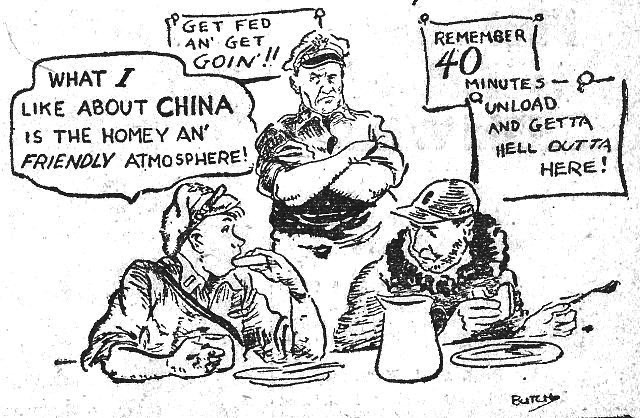

This opus is the result of an invitation from higher headquarters to submit a column for the Hump Express. The invitation went on to suggest that the article "include items of general interest regarding your work, unusual experience, the things you have been able to do for your men, etc." For me that is a rough assignment. I am a recent arrival in this theater and therefore can't tell about the "old Army of '43." Rack my memory though I did, I couldn't for the life of me recall a single "unusual experience." What I have been able to do for the men doesn't seem to have been anything to write home about. And that, as you can readily see, leaves only the "etc.," to talk about. You no doubt have seen "The Flying 69th" and/or have heard of Father Duffy. So had I. Now you would probably never suspect it, but I must confess I am somewhat the romantic type. I could and did picture myself leaping from trench to trench, from foxhole to foxhole, to be with my boys. Fortunately, no doubt, the Army didn't view me in this romantic light. Hence I have never had the hair-raising experiences I thought I'd have. As is the case of the great majority of chaplains, my duties have been those for which I began preparing years ago. And these, I might add, do not, as I have often explained with ill-controlled ire, include ticket-punching. A chaplain is one of the relatively few men who are doing in the Army the same work they did in civilian life. This includes praying for and with his people, Instructing and guiding them in the practice of their faith, bringing to them the blessings of Almighty God, encouraging the weak and consoling the sorrowful. We can do this work wherever we may be, and that is why most chaplains can be somewhat happy even though in India. Shortly after coming here I was invited to a gathering of some Catholic chaplains at one of the nearby missions. None of the men I met, so far as I know, had ever received any special award. Yet there were back of them many accomplishments unsung simply because what they had done was what they were expected to do. They had among them hundreds of miles of travel in bringing their ministrations to scattered outfits. A couple of them had been in some of the worst jungle in the world and had weathered many an enemy raid - all in the course of fulfilling their duty to God. Their combined time spent over here in tending to their flocks would amount to a dozen years. They had accomplished so much good in their many months of service that I hate to report that they lost three volleyball games in a row to the mission boys. All this raving and rambling has finally led me to what I want to say. The chaplains who run into incidents that will make good copy are few. Most of us have merely changed costumes and are still doing the same work we started doing ten or 15 years ago. To us this work is interesting and heart-warming - even thrilling. But our stories of the great experiences we have had and the noteworthy things we see have already and far better been told - such as the case of the Prodigal Son or the Pharisees and Publican or the Good Samaritans. Malum? Now I think that is about enough out of me. We have to leave room, you know, for some of that cheesecake that some otherwise intelligent editors think the boys have to have if they are to appreciate a "newspaper." Chaplain John J. O'Shea, 1337 BU, Sookerating 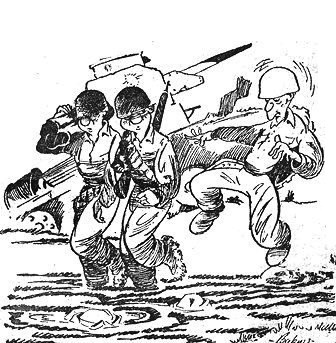 "He has only 17 points to go."
"He has only 17 points to go."
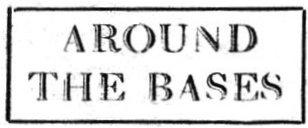
|

I usually read with some interest your column "Chapel Bells." Chaplain Flynn's remarks in that column of the July 19 Express strike me as a strange bit of rationalization, though. True, the only way that the good resulting from the war can be commensurate with the cost is to gain a lasting peace. Even to intimate, though, that the small amount of good that it might otherwise produce is worth the cost, is wrong!
Surely the benefit that a few men may derive from military service cannot begin to compensate for the terrible destruction of war. Probably for every man who gains, another loses; for every man who may find God, another loses interest in Him.
Wherein is the "infinite greatness" of a God who derives an infinitesimal amount of good from a worldwide orgy of slaughter and destruction that He has permitted? Rather, it seems to me that man has caused the war and man has paid the price for it! The good we as victors will gain in retention of our freedom and another chance to build and maintain a permanent world peace.
Pfc. Robert H. Miller, 1347 BU, Shamshernagar




We'd like to put in a bid for crying space in the Mailbag section of the Express, inasmuch as ATCers were recently asked to submit their likes and dislikes in regard to the paper directly to you.
We like the, as it gives everyone a chance to blow off accumulated steam. But why so many comics? Why not some more Stateside stuff, especially sports? Although the paper seems to be getting away from those sill BU promotion yarns, there's still too much of it. Kin Platt could be just a little more subtle. And, by all odds, the nearest approximation to big-time columns is that "Bumps and Grinds" business.
Incidentally, thank God there are less tonnage-delivered-over-the-Hump stories!
T/Sgt. Ray A. Maher and 11 others, 1347 BU, Shamshernagar




I think the Hump Express has taken its place as the leading GI newspaper in the India-Burma and China theaters - especially since its editorial policy started batting for the GIs, rather than the command. But there is one thing I dislike: that is the comic page.
I believe a page devoted to comics is so much wasted space that could be used for sports or world news coverage. I don't think there are many fellows who give a d - - - about what happens to Li'l Abner and Alley Oop. You have my vote towards removing the comic page altogether.
A Non-Comic-Reading Reader, 1337 BU, Sookerating
Ed.- Any more votes - on either side of the fence?




You must have thought you settled the now so-called "transferration" problem and came to a happy conclusion that there would be no more griping on the subject. I hope I haven't disappointed you much, as here is some more:
The information you received, that men whose 24 months are up can expect to return to the States shortly thereafter, and not a year, or six months, later - or when they get around to it - is misleading. Some have been fortunate enough to leave shortly after the appointed time but there are a number of us (not many) who haven't.
Our group, we on our 28th month overseas, are scattered all over the Assam valley. As for the others, I can't say, but we here have just been turned in, and personnel gave out the "good" news that we can look forward to leaving about the first of September, which will just about give us a full 29 months overseas...
What is especially puzzling is - how can they discriminate between men as to who goes home first? I've seen some go home in their 24th month and in even less time than that, while others at the same base, with 26 and 27 months, remain.
The thing is - why build up a high hope in the men, only to break it down in short order?...
I haven't noticed any gripes from the Western sector on the subject - is it because they get to go home when their time is up?
Pfc. Steve A. Duchi, 1330 BU, Jorhat
Editor:
The rotation info has pepped up GIs with "rotation blues" and more letters from Col. Teague and editorials relative to other necessary information, quashing latrine rumors, should be run from time to time.
Now that the rotation boys are happy, there are others who are in a daze about the "point system."
Cpl. John Tallon, 1350 BU




Just read in your July 19 issue the character analysis of my old buddy, Jim Halperin, by, er, shall we say, three gentlemenly officers? I didn't read Jim's original letter, but I suppose he was griping like all good soldiers do. Hell, I've some damned emphatic opinions myself, and I've always respected the guy that pops off, right or wrong, so I'll give Jim credit for that. But I'm not here to defend Jim, he'll take care of himself. I'm here to criticize the critics.
"Do not make this man a civilian" . . . Anyone, much less an officer, should be thoroughly ashamed to append his name to such a statement! Our three critics are terrifically inconsistent. Having already condemned Jim as a soldier, they still want to keep him in.
Now, dropping all pretense of being gentlemen, they slurringly suggest that Jim may have been a draft-dodger. Gentlemen, you remarked that his case was not typical pf all GIs, and may I reply, very frankly, that you do not represent all officers. By your very remarks you have displayed a complete lack of self-discipline, honor and respect.
Sgt. Robert M. Packard, 1343 BU, China
P.S. - Certainly use my name. We're all Americans, aren't we?




A number of people have dropped a little in my estimation recently. They are (1) Pfc. Halperin, for writing his silly letter; (2) Officers Crayton, Porter and Shine, for giving it more than a passing glance and (3) Hump Express, for publishing such damn foolishness.
Ed.- Guess that takes care of us all, but we're twice as naughty as the others. (See letter above.)

When the following news dispatch came in over the wire, we wrote an editorial on strikes in wartime. The censor didn't even leave the title! We print the news report below:
|
Washington (ANS) - Acting Secretary of War Robert Patterson said last weekend that B-29 raids on Japan would "be reduced within a matter of days" if airplane worker strikes in Chicago and New Jersey continue.
Patterson was referring to the strike-bound Dodge Chicago plant of the Chrysler corporation which halted production of B-29 engines and four Wright Aeronautical plants in Paterson, N.J., manufacturers of Superfort parts and Navy dive bombers.
"Unless the 48,000 strikers return to work at once," Patterson said, "it will mean an unnecessary prolongation of the war."
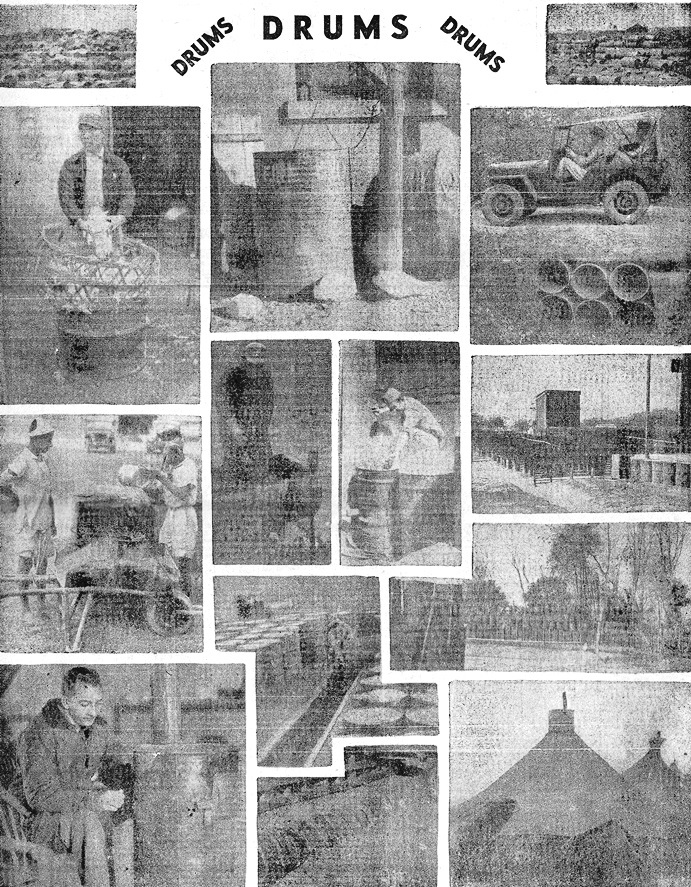

What is it that can be (reading in the usual order) a work table, fire bucket, sewage pipes, wheel-barrow, cook stove, washtub, movie seats, furnace, gutter, truck chock, tennis backstop, Chimney, flower pot, sink, and wall of a sentry box? Right. Along the Brahmaputra and along the Yangtze, it's drums, drums, drums, because gas comes over in 'em, and gas is the blood of the fighting arm being tensed in China to deal the Jap his quietus. (Whew.) And when the gas is used you've got to do something with the drums. Of course you don't have to do all the things shown here, but you can't keep Gold Old Yankee Ingenuity down.
These pictures, all made by the China wing PRO, are from all over the theater. You'll very likely recognize one from your own base. They show "just a few" of the uses of gas drums in these parts, and that's no mullarkey.
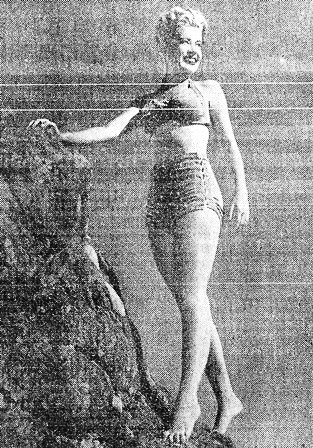 It looks like Gloria De Haven is trying to climb a mountain or something here. In this sport more than one tragedy has occurred when those ropes
let go.
It looks like Gloria De Haven is trying to climb a mountain or something here. In this sport more than one tragedy has occurred when those ropes
let go.
|
Back in Air
1340 BU, Kunming - Lee Tai and Cheng We, German-trained aircraft mechanics, recently put a C-47 back in the sky after other mechanics here had been baffled.
A landing accident accounted for a badly smashed nose on the plane and with no available parts, mechanics red-lined the ship until a new nose assembly could be brought from India.
The two Chinese mechanics came up with their interpreter and requested permission to try their hand at the job. Permission was granted readily.
Le Tai and Cheng We located a slightly mangled nose section on the field and lugged it back to their hangar where they ironed out the wrinkles and patched several holes.
Two days later the C-47, with its shiny new nose, again was plowing through the sky. Lee Tai and Cheng We had done a good job, said local maintenance men.
A Briefing Officer Should Be Linguist Or Know Lt. Yee
1332 BU, Mohanbari, Assam - Fifteen fighter pilots of the Chinese Air Force watched the briefing officer expectantly.
The BO started back, somewhat helplessly. How in the name of Confucius was he going to tell them which course to follow over the Hump? They did not understand English and he was not quite sure what even "Ding Hao" meant.
Then he remembered a young duty pilot who had just checked in on the base. "Get Lt. Yee - on the double," he commanded.
A half hour later Lt. Albert W. Yee had briefed the pilots and they were already on their way over the Hump.
This was not the first time the young Chinese-American pilot had been called in such a situation. Entering the Army in November, 1942, he received his wings at Williams Field, Ariz. Then he was assigned as advanced instructor at OTU, training pilots of the Chinese AF.
The assignment was not as easy as it would seem. He had learned to speak Chinese, but he speaks the Cantonese dialect and most Chinese pilots speak Mandarin.
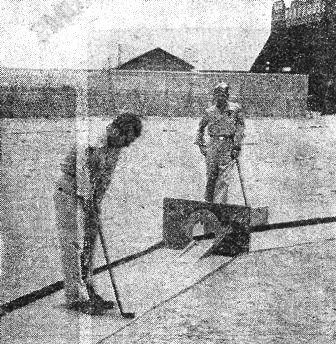 1306 BU, Karachi - Cpl. Wesley Dennison, Shelborne, N.Y. and T/Sgt. Paul Manclark, Turtle Creek, Pa., winners of the doubles tournament at the
miniature golf course on this base, are here shown working the No. 3 hole. Manclark also won the singles tournament.
1306 BU, Karachi - Cpl. Wesley Dennison, Shelborne, N.Y. and T/Sgt. Paul Manclark, Turtle Creek, Pa., winners of the doubles tournament at the
miniature golf course on this base, are here shown working the No. 3 hole. Manclark also won the singles tournament.
|
Sookerating Promoter Is GI's Mike Jacobs
1335 BU, Sookerating, Assam - Maxie Fisher, the local Mike Jacob taking advantage of the monsoon-cooled weather of Assam is pushing his stable of leather-slingers to round them into shape for an evening of face lifting in the Jackal's Den, Sookerating's spacious theater.
Maxie, former welterweight challenger who notched decisions over such boys as Freddy "Red" Cochrane, Tippy Larkin, Eddie Zivic and other first-line fighters, staged a colossus the night Henry Armstrong brought his troupe to Mudville and heard Armstrong say the ring, fighting and accompanying equipment was the finest he had seen in his overseas tour.
Fisher has molded capable boxers out of several boys who were completely inexperienced. None of them may be regarded as future champion material but they have come along enough to make it unwise for any opponent to grow careless.
Maxie is anxious to schedule his team with that of any military installation for single engagements or return matches.
M/Sgt., Pfc. Get Along Fine; They're Husband and Wife
1306 BU, Karachi - Flying in from Jorhat came M/Sgt. William L. Trimmer - just 14 hours after he had heard that his wife was stationed here.
When Pfc. Frances A. Trimmer first stepped on the sands of Karachi she promptly dispatched a letter to her husband, William at Jorhat.
Trimmer took the letter to the great white chiefs and, contrary to usual Army procedure, the sergeant was on his way to Karachi a few hours later. With him he carried a 20-day furlough and the blessings of ICD.
It's back to Jorhat for Trimmer but if there is any way to get a transfer to Karachi he'll probably get it. But if things happen like they did the first year of the couple's married life when the sergeant was assigned to 11 different camps in 12 months, the transfer will be some time in the making.
UTILIZING CIVILIANS
1332 BU, Assam - In line with utilizing civilian employees in all departments, production line maintenance is establishing a school to instruct civilians in aircraft mechanics.
The language problem seemed an insurmountable barrier until Mr. Nauyan Pershad, a well-educated Burmese, applied for a job.
Pershad left a job in Lucknow to satisfy his desire to learn about airplanes.
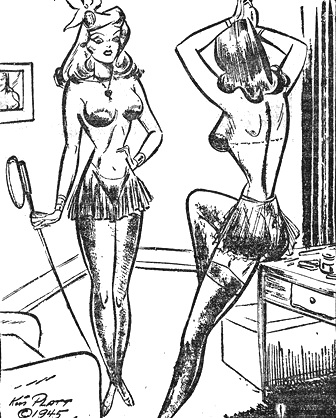 "He says I've got too much make-up on!"
"He says I've got too much make-up on!"
|
Quit Monkeyin’ Wi’ Dat Phone,
Bud, It Ain’t At All Funny
1330 BU, Assam - Monkeyshines on the civilian personnel wire had the phone operators here in a muddle last week. Lights would flash on and off and the only answer to polite, "Number, pleases" was unintelligible sounds.
Thinking that one of the coolies was having fun on the line a husky operator was dispatched but on arrival was greeted with the sight of a monkey tangled up in the phone wires. Every time the peeved operator rang the bell it annoyed the mike-happy monk and he would jabber back into the mouthpiece and jiggle the armrest, thus blinking the panel lights.
Three Harmonikings Bring House Down
At 1345 Appearance
1345 BU, Kurmitola, India - EPU 19, "Aspirin and Red Tape," literally and figuratively brought down the house during a recent performance at "Raider's Roost," the local Red Cross club.
During a number by the Three Harmonikings, a fan came loose, the blade swishing through the air above the heads of the audience. A second later the canvas and lath roof collapsed and an electrical short circuit extinguished the lights. By some miracle no one in the audience was hurt.
HUMP EXPRESS is the official newspaper of the India-China Division, Air Transport Command, APO 192, c/o Postmaster, New York, N.Y., and is published by its Public Relations office. Camp Newspaper Service and Army Newspaper Service features are used, reproduction of which is prohibited without permission of CNS and ANS, 205 East 42nd St., New York, 17, N.Y. Other material is submitted by staff members, ICD-ATC base Public Relations sections and other soldier correspondents. Printed weekly by the Hindusthan Standard, 3 Burman St., Calcutta, India, and distributed each Thursday. Passed by U.S. Press Censor for mailing.
| Military transport schedules over India for cargo, personnel and mail . . . maximum tonnage of essential war materials over the Hump . . . movement of troops and supplies in support of tactical operations in China . . . evacuation of the sick and wounded - these are the missions of ICD-ATC. |

AUGUST 2, 1945
Original issue of HUMP EXPRESS shared by Barbara Skinner Lipiew
Copyright © 2018 Carl Warren Weidenburner
TOP OF PAGE PRINT THIS PAGE ABOUT THIS PAGE E-MAIL YOUR COMMENTS
PREVIOUS ISSUE HUMP EXPRESS BASE NEXT ISSUE
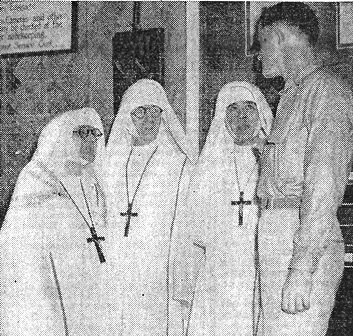 After being harassed by the Japs for many long months, Mother Mary, Mother Desales and Sister Amelia, shown here (left to right) with Cpl. Jack
Tomlinson at the passenger terminal at 1347 BU, are in safe hands again.
After being harassed by the Japs for many long months, Mother Mary, Mother Desales and Sister Amelia, shown here (left to right) with Cpl. Jack
Tomlinson at the passenger terminal at 1347 BU, are in safe hands again.